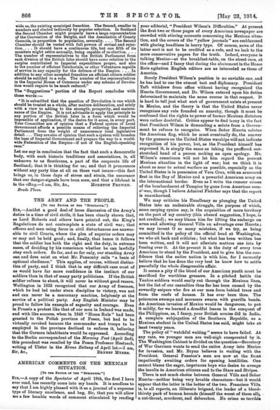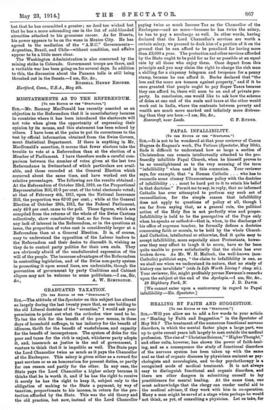AMERICAN COMMENTS ON THE MEXICAN SITUATION.
ITO rex Eorroa or run SIMMT02."1
Siu,—A copy of the Spectator of April 18th, the first I have ever read, has recently come into my hands. It is needless to say that I am highly pleased with it as a journal of a supreme type of literary excellence, and beg, Sir, that you will allow me a few humble words of comment stimulated by reading your editorial, "President Wilson's Difficulties." At present the first two or three pages of every American newspaper are crowded with stirring accounts concerning the Mexican situa- tion, and the covers of the "yellow journals" are emblazoned with glaring headlines in heavy type. Of course, news of the latter sort is not to be credited as a rule, and we look to the more conservative papers for the truth. Indeed, everyone is talking Mexico—at the breakfast-table, on the street cars, at the office—and I fancy that during the abatement in the Home Rule agitation English editors are as interested as those of America.
Surely President Wilson's position is no enviable one, and he has had to use the utmost tact and diplomacy. President Taft withdrew from office without having recognized the Iluerta Government, and Dr. Wilson entered upon his duties determined to maintain the same course in that respect. It is hard to tell just what sort of government exists at present in Mexico, and the theory is that the United States never recognizes any rule founded on anarchy, though it must be confessed that the rights to power of former Mexican dictators were rather doubtful. Critics appear to find irony in the fact that President Wilson is demanding a salute from a Govern- ment he refuses to recognize. When Sefior Iluerta salutes the American flag, which he must eventually do, the answer by the gunners on the United States warships will not indicate recognition of his power, but, as the President himself has expressed it, is simply the same as taking the proffered out- stretched hand of a person making an open apology. Mr. Wilson's conscience will not let him regard the present Mexican situation in the light of war; but we think it is about as near to actual warfare as possible, especially ns the United States is in possession of Vera Cruz, with an armoured fleet in the Bay of Mexico and a powerful American army on the international border. Even as I write the rumour cornea of the bombardment of Tampico by guns from American men- o'-war, though I believe Admiral Fletcher says that the report is unauthorized.
We may criticize his Excellency as plunging the United States into an undesirable struggle, the purpose of which, some carping cynics say, is the acquisition of more territory on the part of my country (this absurd suggestion, I hope, is not credited); we may blame him for lifting the embargo on arms and allowing General Villa an advantage over Huerta ; we may invent 0 so many mistakes, if we try, as being committed in the policy of the official head at Washington, we who sit back and criticize ; but what has been written has been written, and it will not alleviate matters one iota by fussing over it. At the present it is the duty of every true American to stand by the President, and to give him the con- fidence that the entire nation is with him, for I earnestly believe that he has done the very best he knew how to settle peacefully the whole disagreeable affair.
It seems a pity if the blood of our American youth must be sacrificed for worthless greasers. In a pitched battle the Yankee soldiers would easily cut through the Mexican lines, but the list of our casualties thus far has been caused by the cowardly snipers who fire at our men from behind trees and from the roofs of houses. It has ever been thus. The poisonous swamps and morasses swarm with guerilla bands. An American invasion of Mexico would be dangerous, to put it mildly, for we learned a dreadful lesson in the conquest of the Philippines, as, I fancy, your British armies did in India. A complete subjugation of the Southern Republic, as a Mexican student in the United States has said, might take at
twenty years.
The policy of " watchful waiting " seems to have failed. At any rate, we younger men are well-nigh exasperated by it. The Washington Cabinet is divided on the question—Secretary of War Garrison wants to send the entire Army into Mexico for invasion, and Mr. Bryan believes in waiting with the President. General Fanston's men are now at the front impatiently awaiting orders for opening hostilities. One cannot blame the eager, impetuous boys who desire to avenge the insults to American citizens and to the Stars and Stripes.
There is not much choice between General Villa and Seilor Huerta—neither being very lovable characters—but it would appear that the latter is the better of the two. Francisco Villa is, to all reports, an illiterate brigand, the leader of a blood- thirsty pack of human hounds (himself the worst of them all), a cut-throat, murderer, and debanchee. No crime so terrible but that he has committed a greater ; no deed too wicked but that be has a more astounding one in the list of cold-blooded atrocities attached to his gruesome career. As for Hnerta, his power appears to be on the wane in Mexico City. He has agreed to the mediation of the " A.B.C." Governments— Argentina, Brazil, and Chile—without condition, and affairs appear to be a little more clear.
The Washington Administration is also concerned by the mining strike in Colorado. Government troops are there, and a veritable war has been going on for several days. In addition to this, the discussion about the Panama tolls is still being thrashed out in the Senate.—I am, Sir, !sc.,















































 Previous page
Previous page